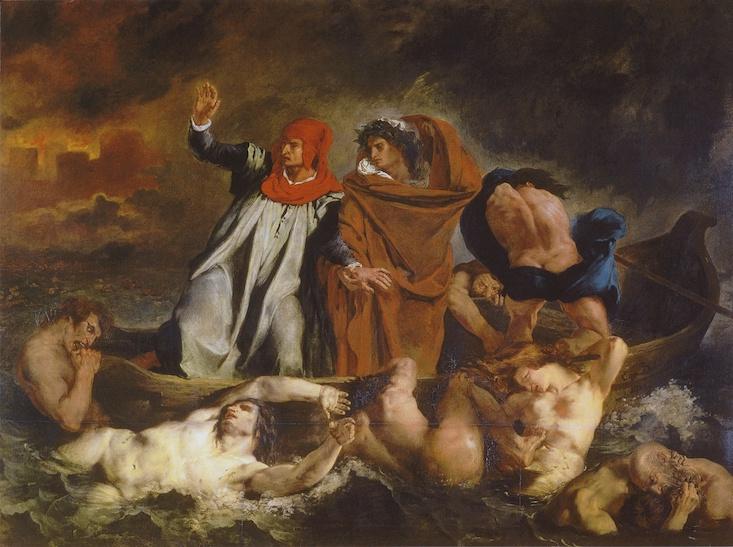
One day in July 1884, four shipwrecked men aboard a lifeboat headed northwest off the Cape of Good Hope. For three weeks, Tom Dudley, Edwin Stephens, Edmund Brooks, and Richard Parker knocked off sharks with oars, drank urine, and even devoured a wayward sea turtle—bones and all—to survive. With no sign of rescue on the horizon, the quartet began to discuss sacrificing one for the good of the group. The following day, Parker fell into a coma. Dudley, seeing an opportunity, gashed open Parker’s neck with a penknife; the remaining trio began to eat. A few days later a German vessel sailing by rescued and returned them to England. There they confessed to killing and eating Parker, were convicted of murder, and sentenced to be hanged. But Home Secretary William Harcourt commuted their sentence—Dudley and Stephens spent a mere six months in the slammer instead of facing the gallows.
This was a lucky and merciful turn of events thanks to the level-headed Harcourt. Though he was apparently revolted by the popular idea at the time that Dudley was a hero for steeling himself against the horror of murder, that evidently didn’t affect the Home Secretary’s judgment in the case. He showed that, because the men were stranded at sea, starving, and had to eat to survive, their punishment could be better calibrated to address a murder less egregious and more understandable than killing in cold blood.
It’s fair to say, however, that back in Harcourt’s day, and for much of human history, punishments skewed harsh—perhaps because it preserves order and promotes cooperation among social species. Hungry macaques, for instance, often attack those that do not alert the group that they’ve found food, likely to teach a lesson about sharing; elephant seal pups caught stealing milk from unrelated females are often bit, and occasionally killed. We’re no different, and it seems humans’ elaborate legal institutions and procedures haven’t significantly altered the psychology we evolved hundreds of thousands of years ago to respond to wrongdoing.
“What we find in very young children and across cultures is that people don’t want harm to go unpunished,” says Fiery Cushman, the lead researcher at Harvard’s Moral Psychology Lab. This is the case even if an action is unintended: After a teenager unknowingly ran over two children who were hiding in a leaf pile in 2014, killing them, Cushman queried an online sample of respondents about the accident, and 94 percent of them believed the driver, Cynthia, deserved imprisonment. But 85 percent, after hearing a version of the story with no kids in the leaf pile, said there should be no punishment at all. “From a certain perspective, these judgments are remarkable: it is a matter of pure luck whether a leaf pile contains hiding children, and Cynthia’s behavior was identical in both cases,” he wrote in a recent paper. “Yet, the amount of punishment we assign is exquisitely sensitive to such chance variation in the magnitude of harm a person causes.”
Cushman believes that when we make moral judgments, the “more primitive, so to speak ‘you caused it, you should suffer’ response never goes away.”
But, sometimes, it can be overcome by knowing more about intent.
In a 2008 study, Cushman found part of the reason why: Different factors matter to us when we’re judging, on the one hand, an act as permissible or not and when we’re deciding, on the other hand, what’s a suitable punishment and whether anyone is to blame. Moral judgements, he writes, are “overwhelmingly determined” by our understanding of what someone was thinking, whether their mental state was “culpable”; but our thoughts on punishment and blame have more to do with “causal responsibility,” or how someone’s actions led to some consequence, regardless of what they were thinking. These two distinct processes actually compete to determine our moral judgement, Cushman concludes: “The assignment of causal blame competitively blocks the assignment of mental culpability, while the silencing of the causal assessment allows the mental-state assessment to dominate.”
“Mercy and understanding, and a discomfort with inflicting suffering on other people, is strong in human nature.”
We also often take people’s actions as a reliable proxy of their mental states. In a 2015 paper, Neil Levy, Deputy Director of the Oxford Centre for Neuroethics, writes, “Because there is a sufficiently high correlation between causing and intending harm in a range of circumstances, we are disposed to take the causation of harm as a sufficient condition for some blame in those circumstances.” The problem here, he explains, is that the proxy may be misleading. Cushman says it resulted in unreasonable legal codes: “Legal codes tend to start focusing just on outcomes. There are instances where our laws reflect that more primitive response.” Hammurabi, the king of the city-state Babylon, for example, put forward lex talionis, an “eye for an eye.” But over time, Cushman says, legal codes “acquire a greater and greater focus on intent.”
Nir Eisikovits, a professor of legal philosophy at Suffolk University, says a clear example of this is the acceptance of defense arguments like battered woman syndrome. In 2006, Mary Winkler shot her sleeping husband, a Christian minister, in the back with a shotgun, and subsequently fled with their three children. She explained in court that she knew what she was doing, and that her motivation for shooting (and subsequently killing) her husband was his years of physical and sexual violence against her, and the mistreatment of their children (he’d suffocate them to stop them from crying). Instead of first-degree murder, Winkler was charged with voluntary manslaughter; and instead of 25-to-life, she spent a year in prison, and 60 days in counseling.
It’s not a stretch to say that even just a few decades prior, Winkler would have been convicted of first-degree murder. But today, in cases like Winkler’s, judges might take into consideration the context of an abusive relationship. Or even the context of how a life unfolds. Take the idea of “historicist narratives,” a “story-like account of how a person came to be the sort of person she is,” write Michael Gill, a moral psychologist at Lehigh University, and a colleague, in a study published in March. They found that historicist narratives “reduce the urge to inflict spiteful punishments on offenders, but leave intact the urge to nonviolently guide the offender toward moral improvement.”
In one of their experiments, the researchers provided subjects different information explaining why Robert Alton Harris killed two teenage boys in 1978. One group received a historicist narrative describing a troubled and abused past, while another received fabricated information that Harris was born with a brain defect. (They told another group, the control, only that Harris killed the boys.) The researchers found that subjects who heard a historicist narrative assigned the least amount of blame because the narrative, the researchers argue, reduced subjects’ impression of how much control Harris had over his “self-formation.”
“The urge to blame and punish is clearly strong, [but] I also think that mercy and understanding, and a discomfort with inflicting suffering on other people, is strong in human nature,” says Gill. “What you see in the legal system is an ongoing conflict between those two motives.”
Matthew Sedacca is an editorial intern at Nautilus.
WATCH: Simon DeDeo on why he started digitizing England’s old criminal records.































